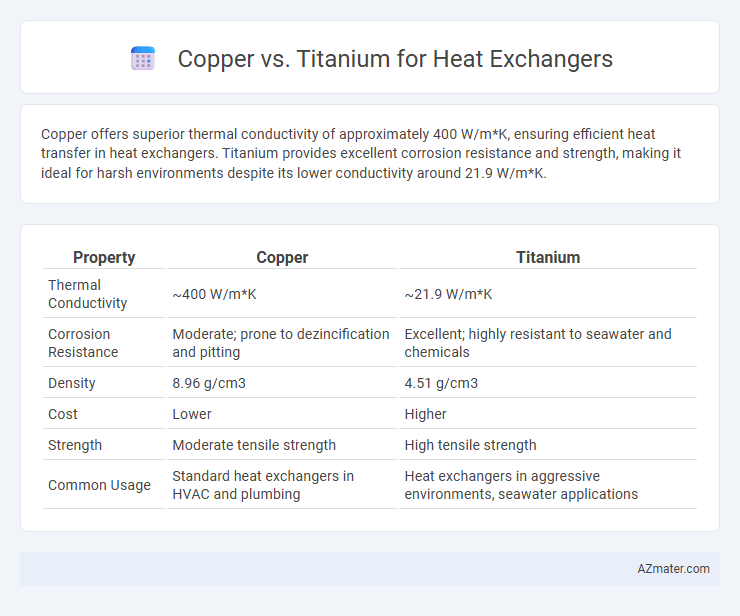Copper offers superior thermal conductivity of approximately 400 W/m*K, ensuring efficient heat transfer in heat exchangers. Titanium provides excellent corrosion resistance and strength, making it ideal for harsh environments despite its lower conductivity around 21.9 W/m*K.
Table of Comparison
| Property | Copper | Titanium |
|---|---|---|
| Thermal Conductivity | ~400 W/m*K | ~21.9 W/m*K |
| Corrosion Resistance | Moderate; prone to dezincification and pitting | Excellent; highly resistant to seawater and chemicals |
| Density | 8.96 g/cm3 | 4.51 g/cm3 |
| Cost | Lower | Higher |
| Strength | Moderate tensile strength | High tensile strength |
| Common Usage | Standard heat exchangers in HVAC and plumbing | Heat exchangers in aggressive environments, seawater applications |
Introduction: Importance of Material Choice in Heat Exchangers
Material selection in heat exchangers significantly impacts thermal conductivity, corrosion resistance, and durability, making it crucial for system efficiency and longevity. Copper offers excellent thermal conductivity and antimicrobial properties but can be prone to corrosion in certain environments. Titanium provides superior corrosion resistance, especially in aggressive fluids, with moderate thermal conductivity, making it ideal for harsh industrial applications.
Material Properties: Copper vs Titanium
Copper exhibits excellent thermal conductivity of approximately 400 W/m*K, making it highly efficient for heat transfer in heat exchangers. Titanium offers superior corrosion resistance, especially in aggressive and saline environments, with a thermal conductivity around 17 W/m*K, significantly lower than copper but beneficial for longevity. The choice between copper and titanium depends on balancing copper's thermal efficiency against titanium's durability in harsh conditions.
Thermal Conductivity Comparison
Copper exhibits a thermal conductivity of approximately 401 W/m*K, significantly surpassing titanium's thermal conductivity of about 21.9 W/m*K, making copper far more efficient for heat transfer in heat exchangers. The superior thermal conductivity of copper enables faster and more effective heat dissipation, which is critical in applications requiring rapid thermal exchange. Despite titanium's lower thermal conductivity, its corrosion resistance and strength often make it a preferred choice in corrosive environments where heat transfer efficiency is less critical.
Corrosion Resistance and Durability
Titanium exhibits superior corrosion resistance in aggressive environments such as seawater and acidic conditions, making it ideal for heat exchangers exposed to harsh chemicals. Copper, while having good thermal conductivity, is more prone to corrosion, especially in chloride-rich or alkaline settings, which can reduce its durability over time. The enhanced durability of titanium heat exchangers results in longer service life and lower maintenance costs compared to copper alternatives.
Weight and Structural Considerations
Titanium offers a significantly lighter weight compared to copper, with a density of approximately 4.5 g/cm3 versus copper's 8.96 g/cm3, making it ideal for applications where weight reduction is critical. Its superior corrosion resistance and high strength-to-weight ratio enhance structural integrity, allowing thinner wall sections without compromising durability. Copper, while heavier, provides excellent thermal conductivity but requires more robust support structures due to its density and lower tensile strength.
Cost Analysis: Initial and Long-term Expenses
Copper heat exchangers typically have a lower initial cost due to cheaper raw material and manufacturing processes compared to titanium, which is more expensive and requires specialized fabrication. Over the long term, titanium offers superior corrosion resistance and durability, reducing maintenance and replacement expenses, especially in harsh or seawater environments where copper may degrade faster. Evaluating the total cost of ownership favors titanium in aggressive applications despite its higher upfront investment, while copper remains cost-effective for less corrosive, standard conditions.
Maintenance and Lifespan
Copper heat exchangers offer excellent corrosion resistance and require minimal maintenance due to their natural antimicrobial properties, resulting in fewer deposits and easier cleaning. Titanium heat exchangers exhibit superior resistance to aggressive environments such as seawater and chemical exposure, thereby significantly extending their lifespan with reduced risk of corrosion-related failures. While copper provides cost-effective upkeep and good durability, titanium ensures longer service life and lower maintenance intervals in highly corrosive or harsh operating conditions.
Applications and Industry Preferences
Copper excels in heat exchangers due to its superior thermal conductivity of approximately 401 W/m*K, making it the preferred choice in HVAC systems, refrigeration, and plumbing applications where efficient heat transfer is critical. Titanium, with thermal conductivity around 21.9 W/m*K, is favored in chemical processing, marine, and power generation industries because of its exceptional corrosion resistance against seawater and aggressive chemicals. Industry preferences hinge on copper for cost-effective, high-performance heat exchangers in less corrosive environments, while titanium dominates in harsh conditions requiring durability and long-term reliability.
Environmental Impact and Sustainability
Copper heat exchangers offer excellent thermal conductivity but pose environmental challenges due to high energy consumption during mining and refining, alongside potential water contamination risks. Titanium, while more energy-intensive to produce, provides superior corrosion resistance and longevity, reducing the frequency of replacements and material waste. The sustainability of titanium heat exchangers is enhanced by their recyclability and lower maintenance requirements, making them a more eco-friendly option in the long term.
Conclusion: Choosing the Right Material for Your Heat Exchanger
Copper offers excellent thermal conductivity and corrosion resistance, making it ideal for heat exchangers in environments with mild conditions and moderate heat transfer requirements. Titanium provides superior resistance to aggressive chemicals and high temperatures, ensuring durability and longevity in harsh, corrosive applications. Selecting the right material depends on balancing thermal performance, environmental exposure, and budget constraints for optimal heat exchanger efficiency and lifespan.

Infographic: Copper vs Titanium for Heat Exchanger
 azmater.com
azmater.com